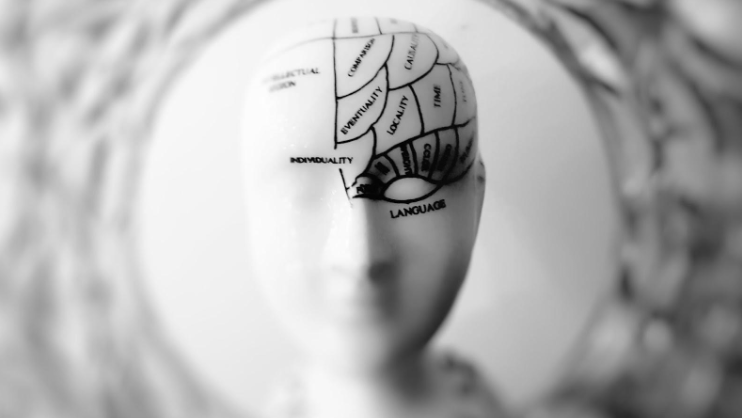Model of the left hemisphere of the brain and cell body of a neuron.
Dementia is classified by symptoms of memory loss, impaired thinking and speech, and inability to maintain social connections.
Despite constant research, science has not discovered a cure for dementia. The primary cause of the disease is neurodegenerative disorders. As different neurodegenerative disorders attack and alter the brain cells differently, it is implausible that dementia can be cured with one treatment.
Currently, scientists are working on stem cell therapy which may be considered the most effective treatment for repairing brain cells and treating dementia.
Let’s learn more about the condition, treatment methods, including therapy based on stem cells, and what its benefits are.
Dementia: What Is It?
Dementia is a disorder associated with the loss of cognitive functions, including recall, thought formation, thought process, and reasoning. Dementia also causes severe memory loss, which is why dementia patients struggle to perform daily tasks independently.
These symptoms are caused by degenerative processes that destroy brain cells and the connections between them, and nervous tissues of gray matter. Gray matter consists of large numbers of neurons that support memory, emotions, and body movement.
Dementia is commonly mistaken for Alzheimer’s disease. The difference between dementia and Alzheimer’s is that dementia is a general term while Alzheimer’s is one of the neurodegenerative disorders. The most common type of dementia occurs in Alzheimer’s disease. Much less common are vascular dementia, Lewy body dementia, and others. In the same person, two or even more types of dementia can be presented simultaneously.
Currently, more than 55 million people are fighting this disease. Each year, almost 10 million new cases are added to this statistic. At this rate, 139 million people are predicted to have dementia in 2050.
How Does Dementia Manifest?
Every person experiences the disease’s onset differently. However, some early signs of dementia are similar across patients. These include:
- Memory problems
- Difficulty concentrating on one task.
- Inability to complete daily functions.
- Struggle to find the right words during conversations.
- Loss of ability to recognize loved ones and well-known places.
- Lack of awareness of time and space.
- Rapid mood changes.
- Increase in depression, anxiety, or apathy.
These symptoms are mild in the beginning and may appear only occasionally, but gradually increase with time. Early signs are often called mild cognitive impairment, or MCI. Some patients may not experience MCI on a severe level, but it does not mean dementia has stopped spreading.
Current Treatments for Dementia
The treatment of dementia is solely dependent on its cause. Alzheimer’s disease is the most common cause of dementia. It is a progressive neurological disorder that damages the brain cells and disrupts connections between them, resulting in the brain’s shrinking. There is no treatment to cure this condition, but it can be managed by Aducanumab (Aduhelm™) therapy.
Aduhelm is the first Alzheimer’s treatment therapy that removes beta-amyloid from the brain. Beta-amyloid is linked with a decline in cognitive functioning in Alzheimer’s patients. This medication is given every four weeks through an intravenous infusion (IV). A constant dose of Aduhelm significantly reduces beta-amyloid production in the brain, decreasing neuron destruction and cognitive decline from dementia.
Medication therapy of cholinesterase inhibitors is another form of dementia treatment. These medications boost brain chemicals that are responsible for memory and judgment functions.
Memantine is also medication therapy for treating dementia. It regulates glutamate activity in the brain, which is associated with memory and learning. Sometimes, doctors prescribe memantine with cholinesterase inhibitors to treat memory loss, brain changes, and thinking and behavioral changes.
Dementia patients are also prescribed multiple medications to treat additional symptoms, such as depression, sleeping disorders, hallucinations, and agitation. Psychological therapies are non-drug approaches to managing behavior and modifying daily functioning.
Despite no cure, it is possible to avoid the condition. If you’re wondering how to prevent dementia, the answer is simple. Maintain a healthy diet, get a good night’s sleep, exercise regularly, and avoid alcohol, nicotine, and recreational drugs. Maintaining good health is the only answer for how to prevent dementia.
Possible Side Effects of Medications Used in Dementia
Like every medication, dementia medication therapies also have several side effects. Aduhelm’s side effects include headaches, confusion, delirium, disorientation, dizziness, blurred or reduced vision, nausea, and head spins.
Cholinesterase inhibitors can cause nausea, vomiting, diarrhea, low heart rate, fainting, and sleep issues. The possible side effects of memantine are confusion, aggression, headache, diarrhea, constipation, depression, and sleepiness, but the most common one is dizziness.
Moreover, there are studies of Aduhelm that have not revealed any benefit, and the effectiveness of the drug is still questionable.
The Use of Stem Cells in Dementia Treatment
Stem cell therapy is a new treatment for dementia. Stem cells are raw materials that can develop into any type of cell, including neurons. They are also able to stimulate tissue regeneration and relieve inflammation within the brain. During stem cell treatment for dementia, a specific stem cell dose (based on age, diagnosis, and weight of the patient) is injected through an IV drip. This treatment may be performed in several sessions, and include a resting period.
After administration, a large number of stem cells locate and repair the inflamed or damaged body area. In Alzheimer’s or dementia patients, stem cell therapy has a high positive result ratio, especially in early diagnosed cases. In particular, these improvements were observed:
- enhanced cognitive functions;
- increased memory and thinking abilities;
- better walking;
- better holding of a conversation;
- improvement of speech;
- more attention to appearance and house condition;
- interest in life occurs.
Is the Procedure Safe and How Is It Tolerated?
According to research, mesenchymal stem cells (found in bone marrow, fat tissue, and several other sources) are safe to use for treatment. Stem therapy has a good tolerance rate. Patients undergoing stem cell therapy only experience some level of soreness and bruising that typically lasts for several days.
Observation of additional complications or side effects requires more clinical trials. Till today, over one thousand studies and clinical trials of stem cell therapy for a number of health conditions have been carried out. Most of them revealed only minor or minimal side effects.
Patients’ Experiences with Stem Cell Therapy for Dementia
In 2015, a cell-based transplant was used to treat dementia caused by Alzheimer’s. In this clinical trial, nine mild-to-moderate patients were given stem cells collected from umbilical cord blood. These cells were directly injected into the hippocampus and anterior hippocampus and showed administration safety.
In another study, a Mini-Mental Status Examination was conducted to determine the severity of dementia before the administration of stem cell therapy. Patients were diagnosed with mild to moderate dementia and having amyloid β-peptide pathology, confirmed through positron emission tomography (PET) scan. Patients were divided into two groups. Both groups were given the stem cell dose, but one group received a lower dose, while the other received a high dose. Some stem cells were also surgically injected into the hippocampus.
The follow-up examination after seven months showed improvement in disability, daily activities, and depression. The subsequent follow-up (after 24 months) showed no change in cognitive decline, and patients had zero adverse effects from therapy. Currently, multiple clinical trials are underway to explore this approach.
In Conclusion
Stem cell therapy is a new treatment plan to stop the progression of dementia. With this treatment, many dementia patients can live improved lives with minimal symptoms. Do you agree stem cell therapy is an effective dementia treatment?



